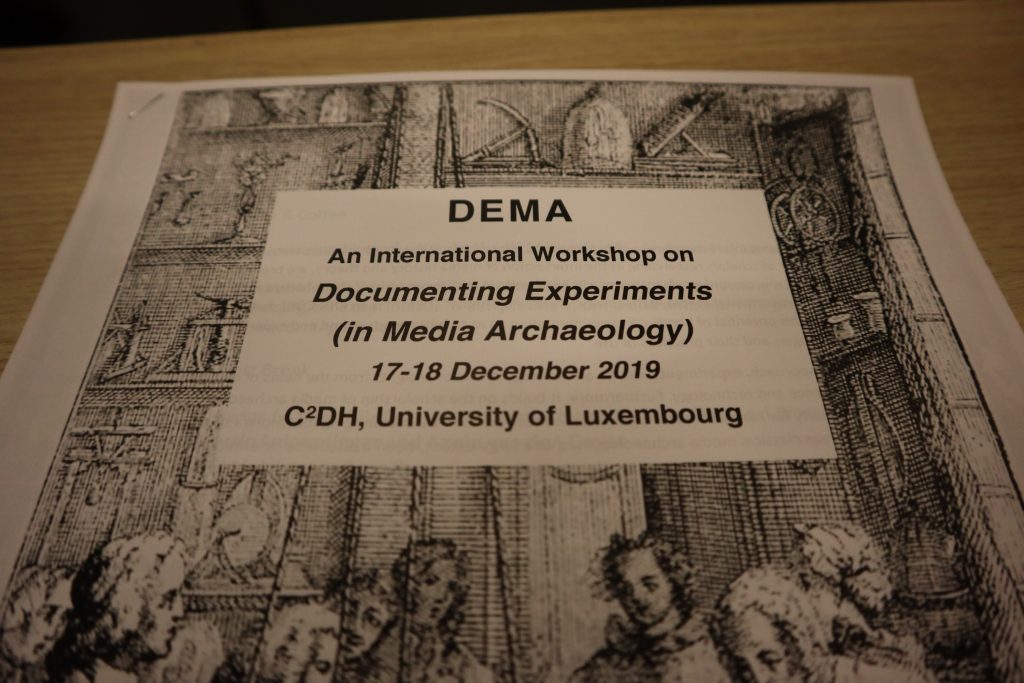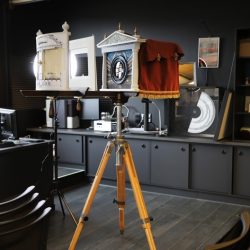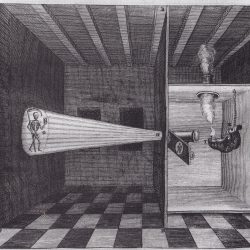
Specialists from various fields and domains, including media history, art history, history of science, experimental phenomenology and classical archaeology, have been invited to this first DEMA workshop to share their experiences in hands-on experimentation with historical objects and practices.
Questions to be addressed in the workshop include:
- What approaches, methods and techniques can we use in documenting historical re enactments and experiments?
- What best practices and “artful failures” can we distinguish?
- What tools or means of documentation can we use (i.e. notebooks, electronic lab diaries, audiovisual media, GoPro and 360 degree cameras)? What are their affordances and limitations in documentation practices?
- How can we learn from other disciplines in documenting hands on experiments and user practices? (e.g. lab journals in physics)
- In what ways does the documentation of historical experiments contribute to new forms of knowledge production?
- What are the epistemological and methodological opportunities and challenges of experimental historiography?
By reflecting on these questions, sharing of experiences and expertise as well as a hands-on exercise in which workshop participants observe and document a historical experiment, the workshop aims to contribute to the development of a best practice guide and protocol that we can use for documenting our media archaeological experiments in the DEMA research project.
Programme
Tuesday 17th December
Workshop – Part I (Location: Digital History Lab, MSH building 1st floor)
15:00 Tea & Coffee
15:15 Welcome and introduction to the DEMA project by Andreas Fickers and Stefan Krebs.
Tim van der Heijden and Aleks Kolkowski discuss the documenting of their media-archeological experiments in early home cinema and amateur film practices and disc-recording respectively.
16:00 Short Break
16:10 Lessons Learned? Reflections on past projects by John Ellis; Lori Emerson; Erkki Huhtamo; Martin Loiperdinger and Annie van den Oever (DEMA Advisory Board).
17:30 Close
19:00 Dinner: Postkutsch restaurant, 8 Rue Xavier Brasseur, 4040 Esch-sur-Alzette http://www.postkutsch.lu/
Wednesday 18th December
Workshop – part II (location: Media Lab, MSH building 1st floor)
09:00 Tea and Coffee
09:15 Hands-on Practical Experiment led by Falk Reiss and Wolfgang Engels: Images of invisible traces: The repetition of historical experiments producing Lichtenberg figures
As a part of our research work, we will demonstrate the uncovering of electric discharge patterns and some attempts to preserve the results with different methods, antique and modern. The participants are invited to join the activities and to try out their own skills and capabilities.
11:30 Reflections on the activity.
12:00 Lunch: Jay Nepal restaurant, 4 Rue John Lennon, Belval. https://jaynepal.lu
Wednesday 18th December (Cont.)
Workshop – Part III (Location: Digital History Lab, MSH building 1st floor)
13:15 Panel 1: Provocations from the fields of the history of science, musicology and museology
Otto Sibum: Gestural Knowledge and Scientific Change
In Experimental History of Science, the bodily and material culture of science is taken into focus. This performative approach of reworking past experimental practice challenges current historiography of science because it reveals dimensions of the past that have never been recorded and hence important historical entanglements of knowledge production remained unknown.
Julia Kursell: Documentation and transduction in hearing, ca.1900.
I would like to discuss how documentation relates to cognition in a new way in the work of the Berlin phonogram archive team. I will focus on Carl Stumpf’s discussion of his Siamese recordings that he published in 1901. I will argue that the steps and functions of transduction and documentation shift in the order of the chain of hearing.
Tim Boon: Histories of Use in a Science Museum: Potentials and Practicability
The intellectual case for operating old machines, instruments and equipment from museum collections is compelling: museum visitors stand to benefit enormously from understanding how objects were used in their prior working ‘lives’. But museum procedures designed to protect objects from harm, and an emphasis on aestheticized visual display, can create unintended boundaries to this kind of work. In this talk I will develop this argument, with a recent example.
15:15 Break
15:30 Panel 2: Provocations from the fields of fine art conservation and film history
Leslie Carlyle: Aspiring to Achieve Historical Accuracy in Reconstructions of Artist’s Oil Paint and the role of Documentation
I will discuss how I approach the concept of “Historical Accuracy” and how thorough documentation is essential for the products of the re-enactment to serve as reference materials now and in the future.
Benoît Turquety: Constructing Ignorance: Experimenting and the Experience of Not Knowing
The first encounter with a machine is generally dominated by pleasure. When it comes to analysing the object though, or describing one’s experience with it, it becomes more difficult. Words may be lacking because the user is confronted with the limits of their technical knowledge. Experimenting then implies to construct that ignorance as precisely as possible in order to make it productive. But the problem can also be that expert knowledge projects on the apparatus a supposed gesture and a supposed result: experimenting then means constructing the possibility of perceiving the difference between the projected processes and the real ones. The documentation of the technical experiment must therefore record first and foremost the difficulties and errors.
17:00 Closing Remarks
17:30 End.



